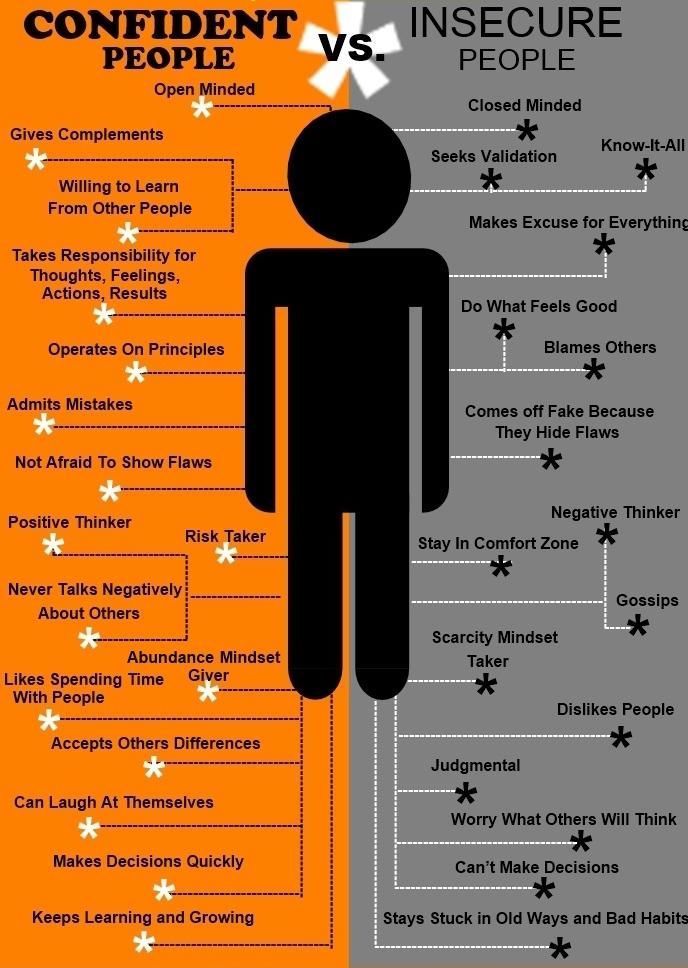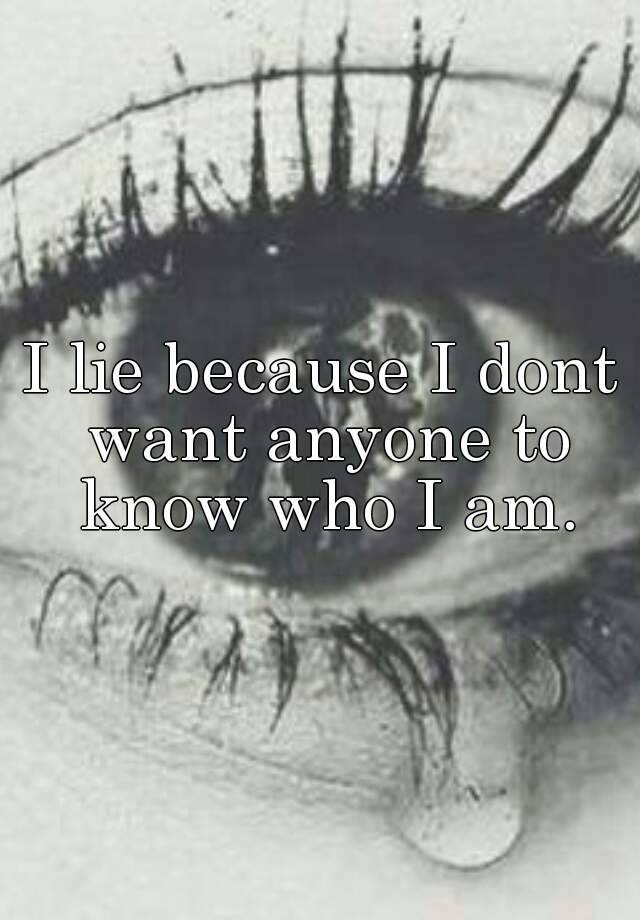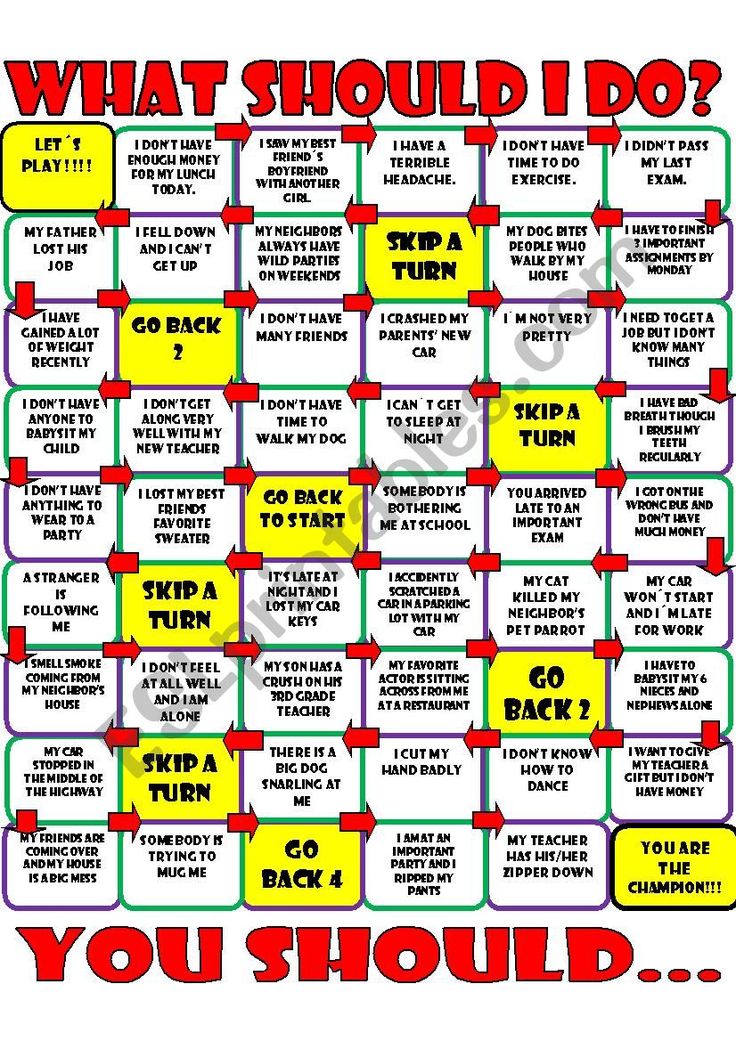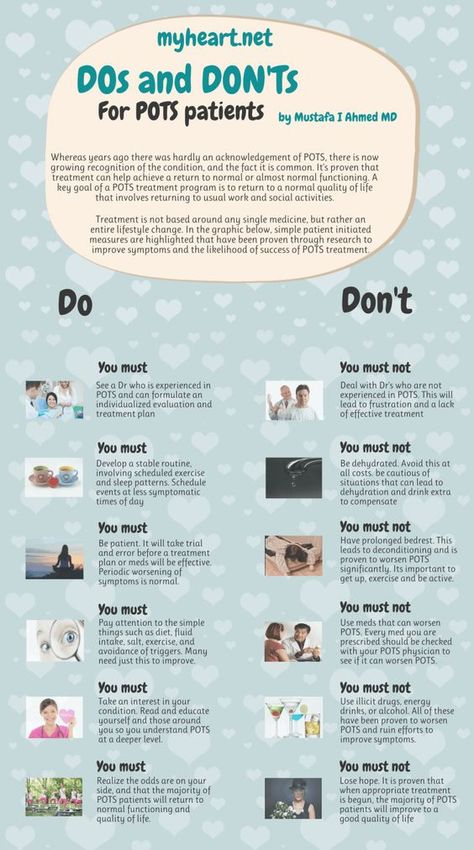How to stop feeling insecure
10 Ways to Overcome Insecurities
Jump to section
What are insecurities?
Three types of insecurities
What are the consequences of insecurities?
What causes insecurity?
10 tips to overcome insecurities
Final thoughts
Some days you feel like a rockstar, like nothing can bring you down. In every situation, you exude confidence. Need to introduce yourself to new people? No, problem — you feel easy, and even graceful, in your own skin, without that nervous feeling in your stomach. Giving a speech to a crowd doesn’t scare you because you feel good about what you’re talking about.
Everyone loves feeling invincible. Or at least super-competent.
Other days, not so much. It’s like a switch flips. Some days, without obvious causes, you want to hide because nothing seems to feel right.
Our insecurities can get the better of us, but that’s entirely normal. We’re all humans and we are wired to notice what doesn’t go well or what isn’t working more than what is. Your inner critic comes out of nowhere and does some damage to your self-confidence.
It’s easy to tell people to stop being insecure, but learning how to overcome insecurities is challenging.
What are insecurities?
Insecurities find their way into every aspect of our lives. We can be insecure about how we look, how tall we are, what our voices sound like, and more.
Insecurities can come from being bullied at school or constantly scrolling through social media and comparing yourself to others. Past experiences can follow us forward and haunt our self-confidence today, or daily events can trigger feelings of inadequacy.
All of our insecurities can come from a lack of self-esteem. They stem from our self-talk revolving around negative thoughts, like self-doubt and questions about our self-image. We often feel insecure when we don’t value our well-being and practice self-care.
An insecure person could feel nervous, anxious, or hesitant about certain things. Whether that’s how well they can do multiplication or what their skateboarding skills are like, these feelings can consume you and prevent you from taking advantage of new opportunities.
Whether that’s how well they can do multiplication or what their skateboarding skills are like, these feelings can consume you and prevent you from taking advantage of new opportunities.
3 types of insecurities
Since insecurities can touch many aspects of our lives, there are a few types to be familiar with. Here are three different types of insecurities to think about:
1. Personal insecurity
Personal insecurities are about how you look or sound and how others perceive you. These surface-level insecurities can seem superficial to someone observing from the outside — worrying about hair or clothing or an unwelcome blemish.
But they can be deeply felt by the individual and cause distress. Personal insecurities can even prevent us from pursuing relationships, career opportunities, or social connections — if we let them.
They can stem from a lack of self-confidence because you care deeply about what people think of you. They often, but not always, relate to body image.
Social media platforms often lead people to compare themselves to others and enhance their insecurities leading to unhealthy coping mechanisms like eating disorders and self-harm.
2. Professional insecurity
Professional insecurities happen at our workplaces and make people anxious and self-conscious to give presentations or speak up.
These insecurities can also fill people with self-doubt and cause them to believe they aren’t good enough for promotions or taking risks. It leads people to experience imposter syndrome and miss out on achieving their goals.
3. Relationship insecurity
Relationship insecurities are common and can occur in any relationship. They make you feel like you don’t deserve your partner and that someone else will make them happier.
These insecurities can lead to jealousy, arguments, and dominating behavior. Relationship insecurities can be caused by past experiences with previous partners or other friends and family members if they’ve caused any trauma.
What are the consequences of insecurities?
We all have our down days, but too much negativity can make a profound impact on your life. It harms our physical health and mental health. Since our insecurities stem from our self-esteem, when we have many insecurities that take over our minds, it causes low self-esteem.
Our low self-esteem can make us more prone to mental health issues like increased anxiety, depression, and more. When our self-worth is low and fragile, we don’t believe in ourselves. This can lead to us abandoning our dreams or living inside our comfort zones.
Having a positive self-image is empowering, but we can be too hard on ourselves when that’s taken away. It can cause people to throw their self-compassion out the window.
Even narcissists are insecure. People who suffer from narcissism are often flexing to compensate for their insecurities.
Insecurities are also troublesome for our relationships. Feeling insecure can cause other feelings of distrust, anger, and even resentment towards our friends, family, and partners. This behavior creates tension for everyone and is unhealthy if left unresolved.
This behavior creates tension for everyone and is unhealthy if left unresolved.
Insecurities don’t have any right to rule your life. If you’re looking for help overcoming your insecurities, then get in touch with one of our coaches at BetterUp. We’d love to help you gain perspective and learn to live a life beyond your insecurities.
What causes insecurity?
We need to know what causes our insecurities and where they come from to overcome them. It can be challenging to pinpoint exactly where each of our insecurities originates, but better understanding the causes of insecurities can help us move past them.
Research has shown that 40% of our happiness comes from how we experience recent life events. Failure in any aspect of life can fill people with self-doubt, negatively impacting their self-esteem and confidence.
Imagine if your boss passed you over for an outstanding promotion at work that you’ve worked hard to achieve. This failure would crush you, and your self-esteem would take a big hit.
Failure can lead to a harsher inner critic if the feeling goes unresolved. You may strive for perfectionism because you won’t feel confident or satisfied without it.
Social anxiety also causes insecurities. When people lack confidence in social situations like family parties, business meetings, interviews, and dates, they feel afraid of how people perceive them.
Are they judging my shoes? Do they think my laugh is too loud? Did I say something stupid? These are all thoughts that someone insecure could have.
Social anxiety can be caused by past experiences such as bullying, being rejected by loved ones, and other incidents of people judging you too harshly.
After negative past experiences, accepting ourselves and our mistakes is difficult. But our confidence won’t improve if we don’t practice better self-acceptance.
10 tips to overcome insecurities
Since everyone has different insecurities, there is no universal way to stop being insecure. You might need to try new strategies if some don’t work the best for you. Keeping that in mind, here are 10 tips to help you overcome your insecurities:
You might need to try new strategies if some don’t work the best for you. Keeping that in mind, here are 10 tips to help you overcome your insecurities:
- Confront your feelings rather than avoid them.
- Have a growth mindset and set solid goals.
- Prepare yourself for setbacks but don’t let them control you.
- Embrace all of your characteristics and passions.
- Challenge your negative thoughts and think critically.
- Surround yourself with positive, encouraging people.
- Listen to other people’s stories about overcoming their insecurities.
- Try new things that make you happy.
- Let go of people and situations that fuel your insecurities.
- Be proud of your progress, no matter how big or small it is.
Final thoughts
If you’re struggling with insecurities or lost in your quest for higher self-esteem, try BetterUp.
When you work with a BetterUp coach, we help guide you to identify the causes of your insecurities and how best to move past them.
How to Stop Being Insecure and Build Self-Esteem
Share on PinterestWe include products we think are useful for our readers. If you buy through links on this page, we may earn a small commission. Here’s our process.
It’s normal to have down days where you feel you can’t seem to do anything right. But feeling insecure about yourself all the time can take a toll on every aspect of your life, from your physical health and emotional well-being to how you perform at your job.
Not feeling good enough can be especially hazardous when it comes to your romantic relationships by making your more prone to feelings of anxiety and jealous. And it doesn’t just affect you. Research shows that self-esteem impacts both you and your partner’s relationship satisfaction.
The good news is there are ways to build up your self-esteem. While it won’t happen overnight, with the right strategies and mindset, you can take steps toward changing the way you feel about yourself.
While it won’t happen overnight, with the right strategies and mindset, you can take steps toward changing the way you feel about yourself.
Take inventory of everything you’re doing right. Chances are, your thoughts about yourself aren’t taking into account the hundreds of positive micro-decisions we make on a daily basis.
Remembering how you helped your neighbor with their groceries or assisted your boss during an important meeting, can help you focus on your contributions rather than shortcomings.
If you’re always looking after everyone else’s needs and forgetting your own, you’re not valuing yourself enough. Adding in more self-care to your daily routine can help you counter negative thoughts and build up your self-worth.
Here are some ways you can show yourself some love:
- Nurture your body by getting a massage or facial.
- Do your favorite workout at least 30 minutes each day.
- Unplug from your phone or take a social media detox.

- Treat yourself to a nourishing meal.
- Practice self-compassion; talk nicely to yourself.
Even just making sure you’re eating regularly and prioritizing sleep can give your self-worth a boost.
There are going to me moments when you fumble — it’s just part of life. But accepting this fact can help you feel more comfortable in your own skin.
The next time you find yourself feeling embarrassed or self-conscious, try to laugh it off.
Learn more about why awkwardness isn’t such a bad thing.
It’s easy to be hard on ourselves after stumbling or making a mistake. But beating yourself up because you didn’t score that big promotion or forgot to make an important phone call keeps you stuck in a negative cycle of shame and self-loathing.
Try to practice countering your negative thoughts as they come up:
- Forgive yourself and understand these are isolated instances that don’t define you as a person.
- Write down your negative thoughts so that you can step back and simply observe them.

- Consider what you’ve learned from the experience and re-focus on the positive. How has this taught you to create a better outcome in the future?
There’s nothing like surrounding yourself with loving, supportive people to build up your confidence and make you feel accepted for who you are.
Make a plan to set up more coffee dates and get-togethers with your nearest and dearest. Seeing yourself through the eyes of those who care about you will help you appreciate your own unique qualities and perspectives.
Think about the times you’ve felt especially insecure. Who were you with? What were you doing?
Noticing the people and situations that deflate your self-esteem can help you pinpoint what to avoid. If you’re surrounding yourself with so-called “friends” who make it a habit of pointing out your flaws, it’s a clear sign to find better company.
Celebrate your successes and talk yourself up when you’ve had a big win at work. Being proud of what you do, even if it seems awkward at first, can have a powerful effect on your self-esteem.
Keep a reminder on hand to help boost your confidence throughout the day by:
- saving compliments people have given you on your desktop or notes app
- writing out all of your accomplishments to review them when you’re feeling insecure
- taking a few minutes each day to list three things you appreciate about yourself
Prioritize spending free time doing things that bring you joy and happiness, whether it’s curling up with a book or cooking a good meal from scratch.
Even better, consider learning a new skill or taking up a hobby you’ve always wanted to try. Aside from making you happy, mastering a new skill is a good reminder of your talents and interests.
Overcoming insecurity and building up your self-esteem don’t happen overnight. Try to be kind to yourself during this process and don’t get discouraged if things aren’t improving as fast as you’d like them too.
Even if you don’t feel confident today, the small baby steps you are taking now will eventually grow into bigger steps and keep you moving forward.
Speaking with a qualified therapist can help you explore your fears and insecurities by understanding where they come from. They can also help you develop new tools for navigating situations that zap your confidence.
Not sure where to start? Our guide to affordable therapy can help.
Books about the nature of insecurity and ways to work through it can not only offer good advice, but also help you feel less alone in what you’re going through.
There are countless books the subject, but these titles are a good starting point.
What to Say When You Talk to Your Self
Through his profound technique, Shad Helmstetter, PhD, teaches you how to let go of nagging, counterproductive self-talk in favor of embracing a more positive outlook on life.
Purchase online.
What’s Right with Me
This book on celebrating your strengths and qualities will help you gain new perspective about your positive traits. Carlene DeRoo, PhD, also offers engaging activities to help you identify what’s going right in your life.
Purchase online.
Self-Compassion: The Proven Power of Being Kind to Yourself
If you’re struggling to recognize your value and worth, Kristen Neff, PhD, provides a road map for being gentle with yourself. Her book includes exercises and action plans for dealing with all kinds of emotional obstacles.
Purchase online.
Healing Your Emotional Self
This book by Beverly Engel is a particularly useful read if you think your self-esteem issues may be rooted in childhood experiences. She documents the many types of psychological abuses children experience while growing up and offers a powerful guide for overcoming low self-esteem.
By recognizing defense mechanisms carried from childhood, you can learn from your past to create a more positive self-image.
Purchase online.
Everyone deals with insecurity on some level, but left unchecked, it can have a big impact on your day-to-day life. Building self-esteem isn’t always easy, and it can take some time, but the end result is worth it. Don’t hesitate to reach out for help if you feel like you could use some extra support.
Don’t hesitate to reach out for help if you feel like you could use some extra support.
Cindy Lamothe is a freelance journalist based in Guatemala. She writes often about the intersections between health, wellness, and the science of human behavior. She’s written for The Atlantic, New York Magazine, Teen Vogue, Quartz, The Washington Post, and many more. Find her at cindylamothe.com.
7 Effective Ways to Get Rid of Insecurity - HEROINE
Lack of self-confidence can easily destroy not only your mental health, but also relationships with others. You may be wondering, “Why do I feel insecure? Perhaps the fact is that someone said words to me that made me feel worse about myself. ”
These irrational thoughts can cause you to behave inappropriately, lose trust in others, and then move from jealousy to accusations. The truth is that these are just your own fears that you start projecting onto your partner or friends. Luckily, you can win the battle against self-doubt, and Heroine has put together a few tips for that.
Luckily, you can win the battle against self-doubt, and Heroine has put together a few tips for that.
1. Admit the problem
The best way to stop feeling insecure is to accept your instability with all your heart. When you've been hurt in battle, after you've recovered, you can start to show the scar with pride - do the same with insecurity. Take it as something that can be overcome in a matter of days and then remember with a smile: "how stupid we were once." Start turning the feeling that you are not worthy of such a life into humility. Remember that whenever uncertainty drags you down, you can only stay afloat by staying aware.
2. Keep in mind that only you can see it
Each of us feels that we need to look a certain way and act in a way that makes us appear confident. But if you are mired in instability and doubt, usually only you notice it. No one can see right through you, and your loved ones are not telepathic. Only specific actions can give you away, and this is always worth remembering if you are experiencing trust issues.
3. Stop communicating with those who unbalance
This is the easiest way to get rid of negative emotions, but at the same time it is extremely difficult to put into practice. If your boss tends to humiliate and insult you in front of your colleagues, you can't just start skipping work.
The same goes for your partner or toxic parents. But you can change your schedule, figure out how to better structure your work, and schedule some self-care rituals to help you recover from a tough conversation.
4. Work on your independence
This advice is especially important for those who are starting to doubt their relationships. Sometimes we mistake an unhealthy addiction for love. It's easy to forget that if you can't love yourself, you can't give someone real love.
Stop asking questions that you can easily find answers to on your own, such as what you should cook for dinner and whether you should change jobs. Of course, you should discuss important decisions together, but at the same time, you should not wait for someone else's approval to change your life for the better. Any relationship needs the independence of both partners and the air between them, so make sure that you do not lose your personality in this love.
Of course, you should discuss important decisions together, but at the same time, you should not wait for someone else's approval to change your life for the better. Any relationship needs the independence of both partners and the air between them, so make sure that you do not lose your personality in this love.
5. Write down emotions
Analyze your self-esteem by regularly writing down how you feel after specific events. Can a compliment from a cashier cheer you up? And praise from the leader? What is the weight of a partner's approval?
Replace the question "why am I so insecure?" to “how can I be successful in the things that give me confidence?”. Convert negative thoughts into concrete actions and this will be your main strategy for dealing with doubts.
6. Surround yourself with a supportive atmosphere
Even the most outgoing people have only a few people around who fully understand them. These friends and family genuinely love and want to be around - so why not increase the amount of time you spend together? Whenever you feel unstable, call or make an appointment with your loved ones to gain strength, even if you have no more than 5 minutes of time.
7. Learn to value yourself
Every time you feel insecure, you focus on feeling what you lack. Try to remember more often how important you are to your company, to your circle of friends, to your family, and even to your blog followers. Remember that all people have different qualities, and when you are not alone, you can complement each other. Consider your contribution to this world and appreciate what you do.
Add to favorites
Share
Related articles:
What to do if you feel uncomfortable all the time
October 24, 2021 Life
Shyness and low self-esteem sometimes interfere with life. Lifehacker asked psychologists what to do in such cases.
Who are prone to social awkwardness
1. People with a certain type of personality
Most often these are psychasthenics - often doubtful, anxious people who find it difficult to approach strangers and start a new business.
Olesya Zvagolskaya
Psychologist, teacher of psychology.
Awkwardness, a feeling of embarrassment, constraint are most characteristic of pronounced introverts who are used to communicating closely only with a narrow circle of people, as well as individuals with increased anxiety. Such people are worried that they can give the wrong answer, offend the interlocutor, or look inappropriate.
2. Insecure people
A person of any type of personality can feel uncomfortable in society if before that he was condemned by his peers or parents for a long time. Even very sociable and optimistic people can lose self-esteem under the influence of negative experiences and being in an aggressive social environment.
Is it necessary to fight it
A shy person is usually not the ringleader and life of the company. However, such people often have other important qualities, such as sensitivity and delicacy. A typical example is director Woody Allen, whose natural shyness did not prevent him from becoming famous all over the world. So the main thing is to accept yourself as you are, and learn how to use it.
So the main thing is to accept yourself as you are, and learn how to use it.
Grigory Bakhin
Practicing psychologist, executor of YouDo.com personal services online service.
Awkwardness is not always a bad quality to fight against. Rather, it is a good diagnostic feature that helps you deal with your inner world. In some situations, awkwardness can act as an additional opportunity to communicate with the right person and establish emotional contact with him.
If the feeling of awkwardness prevents you from living and achieving your goals, try to change your attitude towards this trait and develop new behavioral strategies. You can't completely change your personality type.
Ilya Shabshin
Psychologist-consultant, author of books.
It is pointless to struggle with characterological qualities. This is not something bad, not a flaw, but part of your personality. You need to know about it and take it into account when making decisions. For example, do not go to the special forces.
For example, do not go to the special forces.
How to get rid of awkwardness
1. Define your goal precisely
In any business, a plan and an understanding of your goals will help. Think about the situations in which awkwardness interferes with you: in communication with the opposite sex, with superiors and officials, with new people or with acquaintances too? Imagine what will change in your life when you overcome your social awkwardness. This will help you understand yourself better and encourage you to take further action.
Olesya Zvagolskaya
Psychologist, teacher of psychology.
It is always worth first to be puzzled by the inner side of the issue, namely the alignment of self-esteem and the elimination of anxiety, and then specific communication techniques.
2. See if you can handle it yourself
Sometimes self-doubt and increased anxiety can be signs of social phobia and other serious disorders. There are tests on the Internet to determine the level of depression and the presence of social phobia, but it is better not to get involved in self-diagnosis. If you suspect something like this, contact a specialist.
If you suspect something like this, contact a specialist.
3. Start small
This is a universal tip for all situations, but it's especially important here. If a person of the psychasthenic type expects too much from himself, this will only aggravate everything. There are trainings in which you need to approach strangers on the street and ask them for money or hugs. You should not start with such exercises if they scare you to death.
4. Know thyself
The root of many problems is that a person imagines himself not as he really is. The more we know ourselves, the less we are afraid to seem ridiculous and not like someone.
Our biggest fear is not meeting our own expectations. The feeling of awkwardness arises when we perform an act that is at odds with the illusion about ourselves.
You need to understand your true features and allow yourself to make mistakes, because no one is immune from them.
5. Change the focus of attention
When a person is embarrassed, he completely focuses on himself and his feelings. Instead, turn your attention to others, become genuinely interested in someone's life or story. In the end, it may even be dishonest: perhaps your opponent did not even notice your timidity or oversight, and you no longer listen to him at all and withdraw into yourself.
Instead, turn your attention to others, become genuinely interested in someone's life or story. In the end, it may even be dishonest: perhaps your opponent did not even notice your timidity or oversight, and you no longer listen to him at all and withdraw into yourself.
6. Choose your circle of friends carefully
It is very difficult to increase self-esteem if your loved ones make fun of you or assert themselves at your expense. Get rid of such pseudo-friends, and keep such colleagues and relatives at a maximum distance.
7. Keep records
Make a plan, write down all the successes, patterns of phrases for communication. There is no shame in using cheat sheets for self-development. In addition, written information is better absorbed.
8. Read books on psychology and self-development
Many of them really help to change life dramatically. For awkward people, we especially recommend books on body language and facial expressions, such as The New Body Language by Allan and Barbara Pease and Difficulties in Communication by Andrey Kurpatov.
9. Just wait
As people get older, they gain experience and are less responsive to the opinions of others. So to some extent the problem will be solved by itself. Of course, this option is only suitable if shyness and shyness do not greatly interfere with your life.
10. Don't take it personally
Remember, if someone is rude or taciturn, it probably isn't about you. Probably, this person behaves like this with everyone or is simply not in a good mood. Insecure people are often too suspicious and take any negativity personally.
But we are not responsible for other people's behavior, but we can control our own.
11. Know your worth when trying to make contact
Avoid negativity, but don't fawn or be silent if you've been offended. It is better to blush and stammer to say that you were hurt than to silently leave, swallowing the insult or not understanding the situation.
12. Remember: before you, many have already successfully passed this way
So, it is real for you too.














